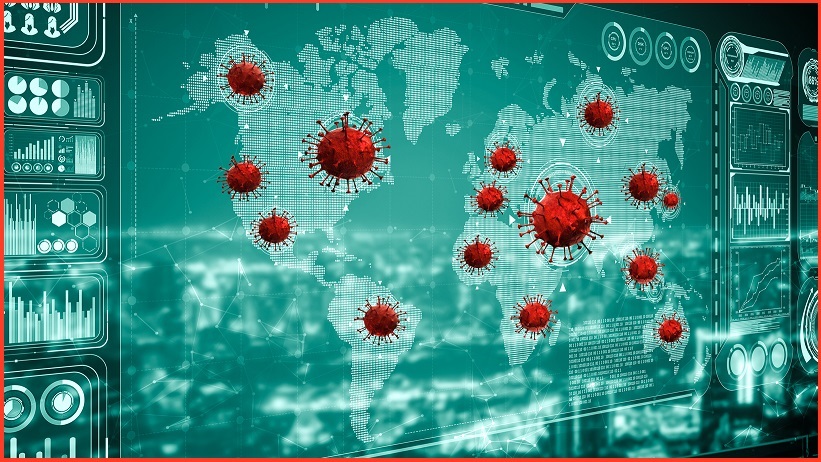Better data analytics will be fundamental to learning to live in the COVID-19 era, a leading medical researcher has warned, as collaborative research networks race to analyse data to understand the disease and its progression.
That understanding had been elusive in the pandemic’s early days, as growing volumes of information about the emerging disease piled up in local information silos around the world.
A team led by Professor John Fraser, director of the University of Queensland’s Critical Care Research Group (CCRG), had last year planned a massive data-analysis project drawing on data from intensive care units (ICUs) worldwide.
They were waiting for the next major flu outbreak to start collecting data – but when the COVID-19 pandemic emerged this year, it was the opportunity they had been waiting for.
The COVID-19 Critical Care Consortium Study has since blossomed into a global data-sharing network, collecting and modelling treatment data from hundreds of ICUs as the pandemic progressed.
“The truth and the data are already out there, and it was growing, but our understanding was not,” Fraser explained during the recent IBM Cloud Forum.
“It was separate, sitting in regional and national silos,” he said, adding that a “sense of intellectual impotence really brought us together”.
Clinicians and researchers from 51 countries are now involved, with late-night weekly videoconferencing meetings that regularly attract 200 or more participants.
The consortium has leaned heavily on IBM’s Watson artificial-intelligence platform to make sense of complex and varied data sets – and this approach, Fraser said, will be crucial as the world tries to re-establish normality despite ongoing localised infections.
“To live with COVID will mean we need to learn and act better in terms of our investment and technology,” he explained, “and this means working synergistically to use our data better, wiser, smarter, and more globally.”
“If used properly, data and technology will help prevent infection, help us treat patients who are infected, and help us be released from our lockdown prison so we can go back to work, play, travel, and education.”
Empowering those at the coalface
The importance of better data practices was echoed by panel participants like Darren Kane, chief security officer with NBN Co, who noted that in this new normal, individuals must increasingly carry the burden of securing their data.
Researchers “are asking individuals to take personal and social accountability for social practices and good hygiene to fight this dreaded disease,” he said, “and I ask very much the same thing from those folks around cyber hygiene”.
Widespread understanding of “the basics” – including continually patching operating systems and applications, and using tools like 2-factor authentication (2FA) – will raise the tide of cybersecurity hygiene.
“Be careful of your fat fingers and what you click on,” Kane said, “and be aware that when you step away from a corporate facility you are now working in a non-protected environment.”
“Ultimately, you have a personal responsibility and accountability to assist us in managing that at the front line.”
Bringing data to the front line has already delivered benefits for Salomé Valero, a Spanish developer whose AI-based Prometeo firefighter health monitor won IBM’s global 2019 Call for Code prize.
The smartphone-sized Prometeo – an Internet of Things (IoT) device designed to be worn by firefighters in the field – measures factors including ambient temperature, humidity, smoke, carbon monoxide levels, then wirelessly relays data to a cloud platform monitored by response co-ordinators.
Firefighters “are putting their lives on the line for us and it’s our moral and ethical duty to help them,” Valero said, noting that competitions like Call for Code provide “the opportunity to help with different skills”.
Real-time visibility of the data will actively support firefighting response, but in the long-term, Valero told the forum that the data would be even more valuable by enabling creation of personalised protection strategies for individual firefighters.
“There are complex global problems out there,” she said, “and the most important thing is that all of us work together to resolve them.”
AI is the key
Resolving complex issues in the healthcare space would require better and clearer AI, noted Bhavna Antony, an IBM research scientist with the company’s Melbourne Research Laboratory.
Whereas research work has conventionally been heavily siloed around one condition to exclude data “noise”, Antony said, AI would help researchers expand their scope.
“The problem when developing AI is that a system will only do what it has been trained to do,” she said, “and if you try to put it in the real world where patients present with all sorts of complications and multiple conditions, it doesn’t work as well.”
COVID-19 patients often show such complexities, meaning that effective analytics need AI to manage multiple variables at once.
“We are finding that we have to start breaking down these silos and start studying multiple conditions at the same time,” Antony explained, “allowing for patients to have more than one condition, then just start looking for patterns within that data.”
This also required a focus on eliminating potential bias in AI because “you have to be able to trust the system and trust that what it’s providing is accurate,” she said, noting the importance of ‘explainable AI’.
New data tools and better sources of data will continue guiding researchers towards important new insights.
“We wait, of course, with bated breath for vaccines and treatments,” Fraser said, “but until that time, bringing the piece of this global jigsaw puzzle together is the strongest weapon we have.”










